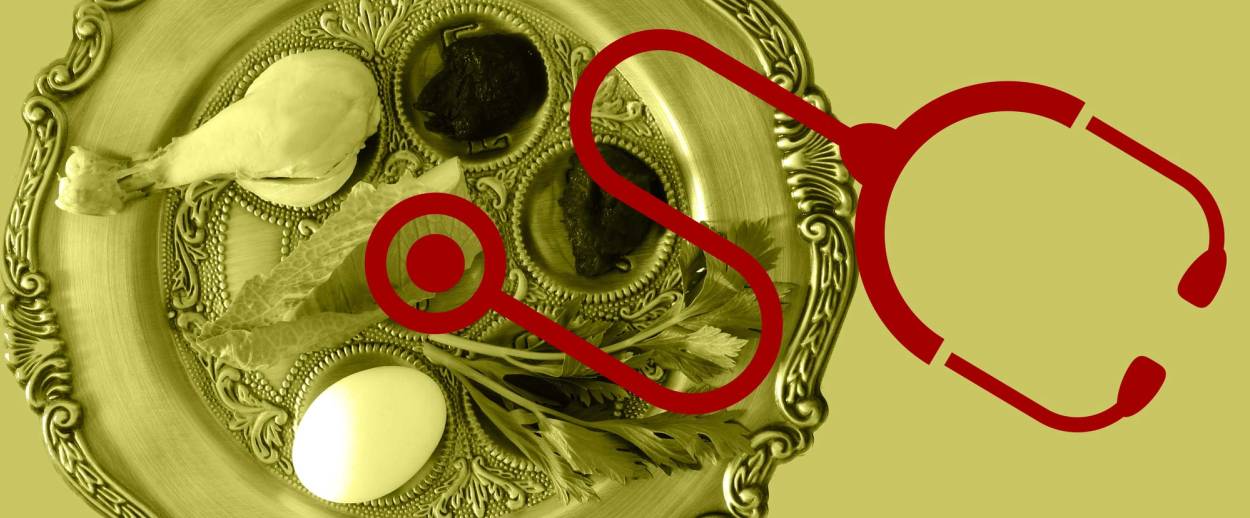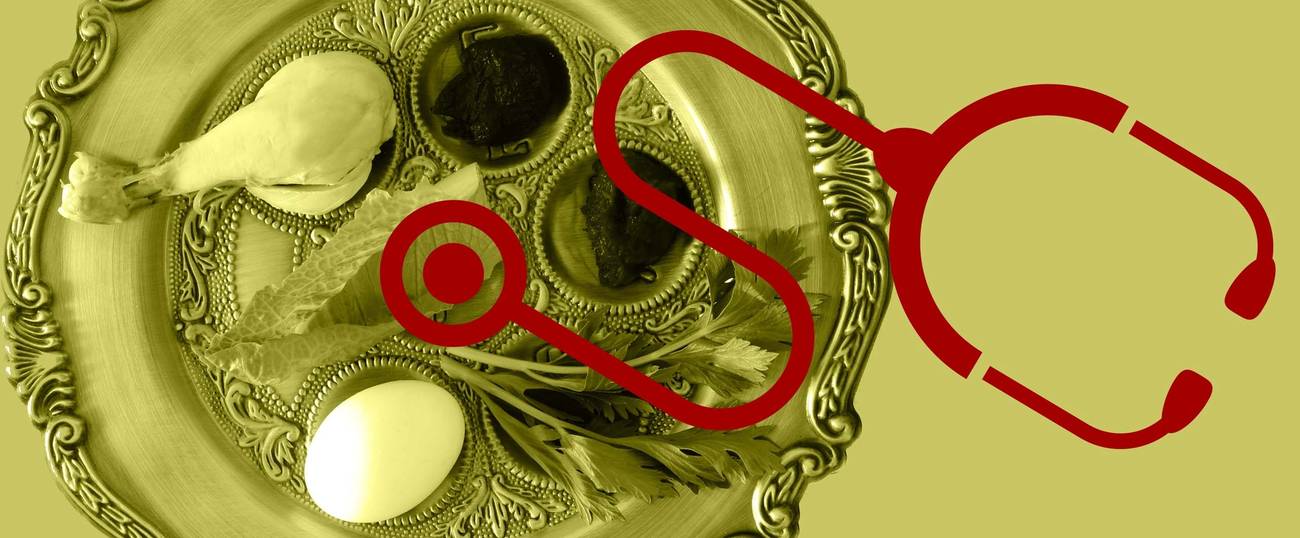A Passover in Self-Imposed Exile
A doctor spends Passover in East Africa, surrounded by disease and suffering, and reflects on the tenuous balance between order and disorder, exodus and return




“Why is this night different from all other nights?” The question is so important that someone must recite the four questions at the seder even if there is no child unfamiliar with the answer. So this year, I asked the question myself, because it was Passover and I was the only one to ask it. Indeed, I was the only one in my room—and it was the first year of my life not attending a Seder at all.
I am in East Africa, here on a medical mission—seeing patients, and teaching medical students and residents. There is something eerie about being here on this holiday. God leads the Jews out of Egypt with a mighty hand and an outstretched arm. In a kind of reverse exodus—is it defiance?—I have returned to the continent of our enslavement. At the Seder table we remember that God led us out of Egypt, freed us from the yoke of slavery. But for me, I live temporarily in a land where nefarious diseases and poverty metaphorically enslave a population.
I examine a 15-year-old female with newly diagnosed AIDS, likely contracted from sexual abuse. And no social worker or legal system exists to help her. Here, a 14-year-old girl goes permanently blind for the rest of her life from a disease easily treated in the United States. We shine lights into her pupils to see if they will react, but nothing happens. We ask if she can see the light and she asks “what light?” Patients with hemorrhages into the brain come in living one day and pass away the next. Infectious diseases reign, especially tuberculosis, caused by a mycobacterium which passes through the blood and into the brain, resulting in fevers, neck stiffness, strokes, paralyzed eyes, and eventually death. We see patients with mumps, tetanus, and fungal infections. And then there are the stroke patients with locked-in syndrome, an affliction of multiple patients here—they are awake, aware, alert, but are completely paralyzed. Victims of autoimmune diseases leading to paralysis of the limbs, where antibodies from one’s own immune system attack the nerves, also come under our care. These are different, certainly, from the 10 plagues of yore yet they are a slight variation of the same theme, or at least the same effect.
But aside from the range of pathology, the paucity of resources and medications here often result in ineffectual efforts to save patients. We have had to watch as numerous patients die in front of our eyes due to lack of space in the intensive care unit, a lack of defibrillators, a lack of CT scans or X-rays. On the first day of Passover, I watched for an hour as a woman took her last breaths, gasping for air in the setting of a blood clot in her lungs. We stood at her bedside as her labored breathing deteriorated, running through the potential options to help her; there were none. The strangest thing is a feeling of helplessness in the face of events that one could easily manage in the same setting back home. The autochthonous physicians here accept this and, after an amount of time we have accepted it, too—a form of bondage inescapable in this part of the world.
During this Passover there is no order, no Seder. This Passover overflows with a sense of displacement, disorder and exile. This is not an unusual feeling for a Jewish physician. It is probably closer to what most Jewish physicians have experienced throughout Jewish history, not merely because of what they saw and who they treated but because of who they were. In 692 CE, an ecumenical council in Constantinople declared: “No Christian whether layman or cleric may eat the unleavened bread of the Jews … receive medicine from them or bathe with them. The cleric who does so is deposed, the layman is excommunicated.” In the 14th century, a prominent gentile physician, Arnold of Villanova, told Pope Boniface VIII: “… every Christian who entrusts his body to the medical treatment of Jews merits excommunication and is guilty of a capital crime.”
On the other hand, Jewish physicians occasionally had more freedom than their fellow Jews. True, Jewish physicians were maligned but often with a wink and a nod. When Queen Isabella married King Ferdinand in 1479, thus creating a unified Christian Spain that would hunt down the Jews, exceptions were made. Ferdinand and Isabella retained Jewish physicians in the court. Ferdinand remarked: “Just as it is necessary to refute misbelievers with the Catholic cult of the Christians and to repulse them, so it is not absurd to accept them in many things, especially in those in which without injury to our faith they may be useful to us, not doing harm to the healthfulness of our soul, but aiding us in the condition of our body.” Around the turn of the 14th century, one Christian physician bemoaned the presence of Jewish physicians in the courts: “Jews are universally entrusted by the great with the care of their health. Nor is the Church free from this abomination, for nearly every monastery has its Jewish physician.” The royal courts persecuted the Jews but defended the retention of Jewish court physicians in the same breath. Thus, the tension between exile and redemption, or freedom and bondage, is inextricably linked in Jewish history and in the medical profession. Indeed, for Jewish physicians that tension is particularly poignant as Jewish physicians had some sense of freedom but mostly remained in bondage.
To be sure, I have been fortunate not to experience any kind of discrimination here—I was told by one colleague (I’m the first Jewish person she has ever met) that the Jews are “blessed people.” But I still recognize that tension and experience it, being in a city devoid of Jews and saturated with tragic medical outcomes. And being here on Passover, I feel the tension between exile and redemption most strongly. We ought to feel this on Passover. Our answer to the four questions after all is, “We were slaves to Pharaoh in Egypt, and the Lord, our God, took us out from there with a strong hand and with an outstretched arm. …” We were once slaves but now we are free. It is as if the Haggadah has stopped time at the Exodus. We are no longer slaves; we once were. Now, we can celebrate.
This is, in some sense, disturbing and disingenuous. As Jews we know freedom never exists without exile; redemption never exists without slavery. We are poised on the brink of freedom but it is a freedom that is always in question, always with an asterisk. We can live in Israel as Jews yet we face a rising tide of anti-Semitism. Coming back to Africa as a Jewish physician, unfettered by the medieval Christian courts, unencumbered by travel restrictions or visible anti-Semitism, I am as acutely aware of exile as ever. I am free but I see disorder and disease here. I experience the helplessness of a carpenter without a hammer. I miss the order of the Seder, surrounded by family and tradition. I miss the order of a wealthy, seemingly limitless medical system. Thus, this trip has been a reminder of the importance of the innocence of the four questions, of revisiting what appears to be a simple telling of a simple story in response to a simple question. Why is this night different from all other nights? Because it gives us some sense of the chasm between exile and redemption, between order and disorder, between Pharaoh’s Egypt and the land of Israel.
***
Like this article? Sign up for our Daily Digest to get Tablet magazine’s new content in your inbox each morning.
Aaron Rothstein, M.D., is a neurology resident at the NYU School of Medicine. He blogs regularly for The New Atlantis.